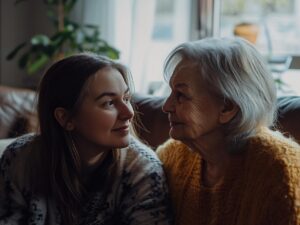DIVINE covered Breast Cancer Awareness Month, but just because October is over doesn’t mean that it still isn’t an important topic. Breast cancer is a year-round challenge for many women. Metastatic breast cancer (MBC) impacts many women. It is breast cancer that has spread to other organs outside of the breast. This may include bone (skeletal metastases), liver, lungs and brain. This is also known as Stage 4 or advanced breast cancer. Stage 4 cancer is scary, and three out of ten women diagnosed with breast cancer will go on to develop MBC.
Although improvements have been made to treatments, there is a 25% survival rate* with people diagnosed with MBC. All hope is not lost though. Women are living longer with MBC and there have been three treatment options that were recently released in the Canadian market including VERZENIO (abemaciclib).
“Targeted therapies like abemaciclib, may help patients whose breast cancer presents with certain disease characteristics that confer a less favorable prognosis,” says Dr. Christine Brezden-Masley, Medical Oncologist, Medical Director of Cancer Services, Mount Sinai Hospital in Toronto, Ontario. We had a chance to speak with Dr. Brezden Masley and learn more about MBC and the effect that the prognosis can have on women both physically and emotionally.

There are different types of metastatic breast cancer. In simple terms, can you explain the difference between the HER2+ and HER2- subgroups?
There are different subgroups of breast cancer. Most (75%) of breast cancers are driven by estrogen and are known as estrogen receptor positive (ER+) breast cancer. Treatment typically involves medication that blocks the estrogen signal. About 20% of breast cancers can over-express and be driven by a mutation in a protein called HER2. These tumors are known as HER2+. There is targeted treatment against this protein, known as anti-HER2 therapy. These medications include antibodies or small molecules that specifically target these HER2 over-expressing breast cancer cells throughout the body where they have metastasized.
About 50% of the HER2+ breast cancers are ER+ and 50% are ER- (no expression of estrogen receptors). Lastly, about 15% of breast cancers are known as triple negative (ER-; HER2- and also negative for the progesterone receptor). These metastatic triple negative breast cancer (TNBC) patients may have a chance to respond to immunotherapy, but will always need some form of chemotherapy as there is no estrogen signal to block.
When a woman is diagnosed initially as having MBC, it can be extremely scary especially when she hears the statistics. What should a woman know at diagnosis? How do you, as an oncologist help her manage her journey?
A new diagnosis of MBC is very scary. First, we discuss where the cancer has spread to and whether she has any symptoms from it (e.g. back pain from bone metastases). Then, we discuss what type of breast cancer it is (e.g. ER+/HER2- or TNBC or HER2+). The type of MBC will guide our treatment. If its ER+/HER2- then we have combination targeted treatments that work very well. If there are bone metastases, then we also treat that with bone modifying agents.
We also discuss whether there are clinical trials if she is eligible for and interested in participating in. We have many other members of our team that also support our patients: social workers, dietitian, pharmacist, nurses, psychiatrist and palliative care physicians. We all work in a team to ensure we can give the best support, education and empowerment to the patient so she can make the best treatment decisions for her, including her family/friends if needed.
MBC means that the cancer is treatable, but not curable. What advances have been made in the treatment of the disease?
There have been significant advances in ER+/HER2- and HER2+ MBC. We are still working and studying TNBC with some improvements (such as immunotherapy for select patients). The newer endocrine combination treatments for ER+/HER2- (the most common type) have demonstrated significant improvements in survival and more treatments are in the pipeline that target certain mutational drivers of these tumors.
For HER2+, there are novel antibody therapies that are targeting these tumours in a different way and women are living longer with the availability of these therapies. We continue to study TNBC with immunotherapy showing some activity, testing for BRCA mutations and treating with PARP inhibitors (another targeted therapy). We still have a way to go to conquer this type of breast cancer, but many of our patients are living longer and experiencing a relatively good quality of life with these newer effective therapies. However, we still need to find treatments that continue to be effective for very long periods of time.
How does someone, who likely will be on different chemotherapy, biological therapies and potentially estrogen receptor therapies manage her side effects (knowing that some may vary)?
MBC patients are educated about their treatment and their side effects. This is initially done by the treating and prescribing medical oncologist, then again supported by the pharmacist and oncology nurses, specifically in the chemo suite. Within Ontario, Cancer Care Ontario has rolled out a program whereby oncology nurses are available after hours (5pm-8am weekdays; 5pm-8am during the weekend) for all cancer patients on systemic therapy. This allows for rapid support of patients.
What is the psychological impact of the disease on most women? What tools are there to help women cope with the stress and uncertainty of MBC?
There is a significant impact on women, a cancer diagnosis does that. The larger impact is not only psychological, not knowing your future, not knowing if you will die of the disease, not knowing if your family (children) are at risk of developing this disease. Body image, sexuality and fertility can also be heavily impacted with breast cancer patients, specifically if they are young (less than 40 years of age). Financial stress, relationship stress, work stress can also negatively impact one’s ability to heal and go through the recommended therapy. And lastly, the side effects of therapy, low estrogen, nausea, fatigue, difficulty concentrating (chemo fog/chemo brain) hair loss – all contribute to affecting one’s life and once again impacting on their overall well-being adding psychological stress.
Listening to the patient is extremely important to ensure that we can support their needs and decrease their stress. We work with a multidisciplinary team, so if someone is having difficulty navigating their finances, we ask our social workers to become involved. If someone is having issues with sexuality and intimacy, we ask our gynecologists and nurses to educate and support our patients. If patients are feeling anxious and depressed, we ask our psychiatrists or social worker/psychologist to provide support. If patients have too much pain, then we can engage our palliative care teams to provide the best pain management for them. These are services that we provide to our patients to ensure they are supported throughout their cancer journey. Thereare support groups (e.g. CCS; CBCN; ReThink) all who are amazing in providing education and support for all of our breast cancer patients.
What can families and friends of the patient do to provide support?
Attend their clinic visits, drive them, provide support in the home, provide meals, provide child care and if they come to the clinic, be a scribe for them. Empower patients and let them know that they are not alone.
Last, but not least, how do you give a patient with MBC hope so that they stay positive in their healthcare journey?
Educate and empower the patient about what they are going to expect. Most importantly, we need to stay positive. We have many tools in our toolbox that we can use, we need to encourage them to fight with us. If they don’t want to fight anymore, and some become too tired, then we continue to support their decisions and work with our palliative care team to support them and their family members. We don’t want patients to feel alone, we strive to encourage them to make the right decision for them with the information they need.
If you or someone that you know has metastatic breast cancer, there are support programs in your community. The Canadian Cancer Society has everything from peer to peer support to online support and information services to help.
*Cardoso F, et al. ESO-ESMO International Consensus Guidelines for Advanced Breast Cancer. Annals of Oncology 2018;29:1634–1657






